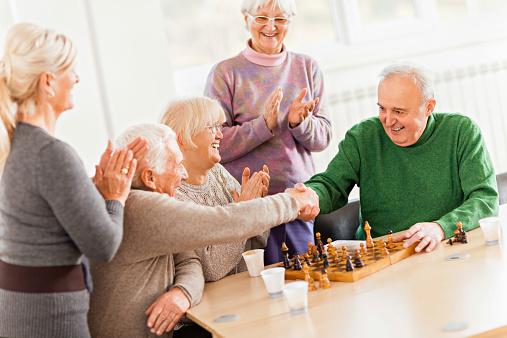
Therapeutic chess.
Most of the studies dedicated to showing the psychological effects of confinement, report negative results associated with stress, confusion, anger, frustration, fear, panic, bad expectations about the financial future, among others.
In this scenario, the chessboard becomes a lifeline to mitigate this context regardless of the player's age, or where they are.
Chess is an invaluable therapeutic tool in times of isolation. Even impacting the consumption patterns of internet data. Its adaptability to technology has given the activity an unprecedented convening capacity. Virtual meetings have become popular appointments for experts and beginners. Social distancing has been overcome in the hundreds of online tournaments that take place every day. Without prejudice to the classes and tutorials on the subject. Even visually impaired chess players have dabbled in the use of the internet, most of them playing for the first time, online games in connection with the quarantine.
Coach-athlete relationship
The virtual calls to participate in tournaments or online classes represent a social exchange that brings benefits in the volitional field in terms of the determination to give continuity and the preparation and improvement of all possible aspects to achieve mastery. The coach, in the search for excellence, establishes the path to positively mediate in the development of the potential of the chess player, starting from a diagnostic phase, in order to specify and establish what the needs to be addressed are. It is necessary to study the psychological state that accompanies the athlete due to its incidence in greater nervous activity.
The virtual calls to participate in tournaments or online classes represent a social exchange that brings benefits in the volitional field in terms of the determination to give continuity and the preparation and improvement of all possible aspects to achieve mastery. The coach, in the search for excellence, establishes the path to positively mediate in the development of the potential of the chess player, starting from a diagnostic phase, in order to specify and establish what the needs to be addressed are. It is necessary to study the psychological state that accompanies the athlete due to its incidence in greater nervous activity.
However, even when online games such as face-to-face games have the same rules, there are differentiating elements in terms of the player's reactions to the opponent, with different environments that can influence their mood. In a head-to-head game, the opponent will play strategically, while the PC will play tactically, and if the player continues to play against the computer indefinitely, they could be under the influence of a style of play that is far from human. and at the same time ending the very frustrated confinement in face-to-face tournaments. All of these problems must undoubtedly be addressed in training.
Therapeutic Chess
Chess constantly challenges us to improve ourselves, after each game and its subsequent analysis. It reaches a therapeutic level based on self-knowledge, planning, attention, memory, flexibility of calculations in the face of possible variants, impulse control, self-management of emotions, management of frustration, success and failure, tolerance and empathy. At a psychosocial level, it manifests itself in the acceptance of norms, promotes honesty and integrity of the person, acceptance of ideas and points of view and teamwork (when playing as a team, individual performance influences the overall result of the group)
Generally speaking, chess provides a positive social outlet, a healthy recreational activity that can be easily learned, enjoyed at any age and is adapted to physical disabilities.
Chess and Leadership
During confinement, the online gambling boom has revealed thousands of testimonies around the world, even a board has been created whose dimensions allow maintaining social distancing, and with the ability to move the pieces without touching them, using tweezers designed for this purpose. .
All of this reveals the need to stay active in what we are passionate about, despite adverse circumstances. That need to defend a purpose is undoubtedly a characteristic of leadership.
And it is that the game of chess offers us a platform where the smallest piece, the pawn, can be the protagonist of the winning movement, and obviously because we are facing a game of strategy.
The pawns move to build traps on the knights, the rooks are held in reserve to support a castling, and the bishops coordinate with the queen to flank the king. Each piece has its function, and it is necessary to achieve victory.
By Nicola Nigro
NicolaNigro@gmail.com